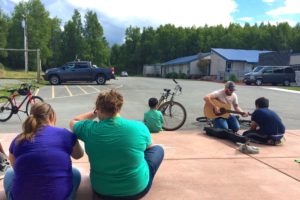

Most traumatized children and teens have few places to turn for help in today’s society. Mistreated and abused by adults who’ve been entrusted to care for them, many face a lifetime of regrets.
But through Birchwood Behavioral Health, Alaska Baptists are providing a source of help.
“Birchwood Behavioral Health has been a stable influence in the lives of many young people through the years and continues to provide a haven of rest and comfort for children in crisis,” said Randy Covington, the executive director of the Alaska Baptist Convention. “Alaska Baptists are committed to addressing the developmental needs of children, which includes the foundational truth that there is a perfect Father in heaven who loves them.”
The Alaska Baptist Convention began Birchwood as an orphanage in 1948 after a statewide diphtheria outbreak left many of the state’s children without families. In 1972, Alaska Baptists converted the orphanage into a treatment center for severely emotionally disturbed children.
Today, the center focuses specifically on helping children who have faced trauma.
“We are about helping children who have been traumatized in some shape, fashion, or form in their lives,” said David Banks, Birchwood’s executive director. “Trauma causes all kinds of problems later in life. Kids often get in this fight, flight, or freeze mode. That’s the correct response for trauma when it’s happening. But after a trauma is over, you should be able to go back to life as normal. But the kids are not. It’s similar to PTSD.”
Overcoming the ‘Flight or Fight’ Syndrome
The agency offers both inpatient and outpatient services. For the inpatient services, they provide a home-like environment for boys ages eight to thirteen. They also provide a similar environment for girls age thirteen to eighteen. The average length of stay is six to nine months.
“We try to help them see they’re in the here and now,” Banks said. “They’re no longer in danger. They can feel safe. Then we teach them certain skills, called resiliency or coping skills, so when negative things come, they can deal with them instead of throwing a chair or turning a table over.”
Banks says they try to build a regular routine into the children’s lives while they are at the home. All the children attend public school. They have regular emotional check-in times, participate in group and individual counseling sessions, and attend family therapy (usually weekly). They also have time for recreation and tutoring during their week.
“We try to bring stability into their lives because a lot of the kids come from an unstable home,” Banks said. “We build structure into their lives from the first day they are here.”
The outpatient program serves children four and up, adolescents, adults, families, and couples.
A Christ-centered Approach
Birchwood is a member of the Baptist Coalition of Children and Families, which represents twenty-one Christ-centered ministries throughout the United States. While many of those other agencies are funded solely through the support of Baptist churches within the state, Birchwood gets most of its funding through government sources (either through grants or Medicaid).
“Many would think this funding would restrict Birchwood from sharing the Gospel with these youth, but the state realizes that spirituality is a strong component in an individual and can be a great help in the healing process,” Banks said. “Birchwood Behavioral Health uses Jeremiah 30:17 as its pillar of hope: But I will restore you to health and heal your wounds, declares the Lord.”
Banks notes that Birchwood’s staff can’t impose its beliefs upon the children whom they help, but he also notes “there’s no such thing as valueless therapy.”
“We share with them what works from our perspective,” Banks said. “If they have already some Christian background and they invite spiritual discussion, that’s an open door. We ask kids if they would like to have prayer, the treatment counselors pray over meals, and we have kids who ask for prayer at bedtime.”
He also notes that church groups come in regularly and do programs for the kids, and the children go to church every Sunday.
A Gifted and Trusted Ally
Corey Pepiton, who serves as the student pastor and the Huffman campus pastor for Anchorage’s Rabbit Creek Church, has seen Birchwood’s value firsthand as both a former board president and as a foster parent. After leaving the board a few years back, Pepiton and his wife became foster parents of eight- and nine-year-olds. They soon realized the two children had difficulties that were deeper than they first understood.
“As we struggled for resources to provide for their needs and help them work through the difficulties they were experiencing, my friends at Birchwood Behavioral Health were the first place I turned,” Pepiton said. “Though their schedule for counseling was indeed already packed, they found room for my two children. The growth that my two foster children have experienced under the care of Brittney at Birchwood Behavioral Health has been startling. They see her as a trusted friend and feel welcome to share their struggles with her. I see her as a gifted and trusted ally in the care that we provide for these two youngest members of our family.”
Banks can point to numerous other success stories from Birchwood. For privacy concerns, he can’t share the names of the children though.
One of those children who recently graduated from the program said of her time at Birchwood: “Birchwood has been helpful. It may not be a place where you want to be, but in the end you can see it’s helping. The people and the staff are okay, and they keep you busy. I really enjoyed the therapy dog. The therapy can be hard, but
it’s helpful and keeps you going in the right direction.”
Banks asks Southern Baptists to pray that God would bring staff to the agency who love the Lord and will incorporate their love for Christ into their love for children. He also asks Southern Baptists to pray that God would continue to supply the finances and the volunteers needed to help Birchwood fulfill its mission.


















